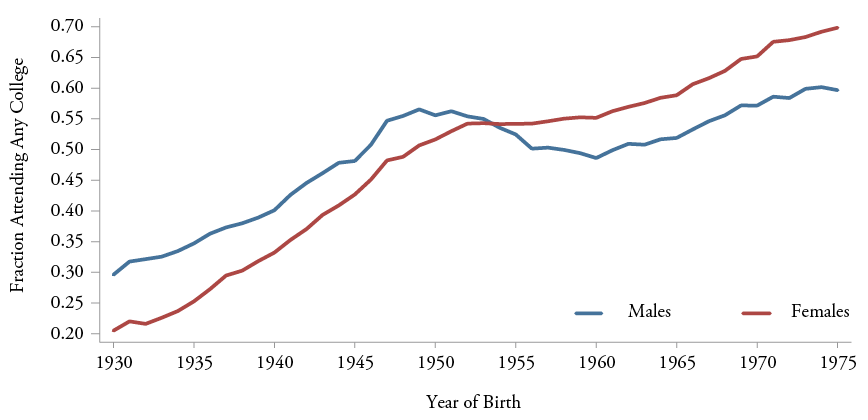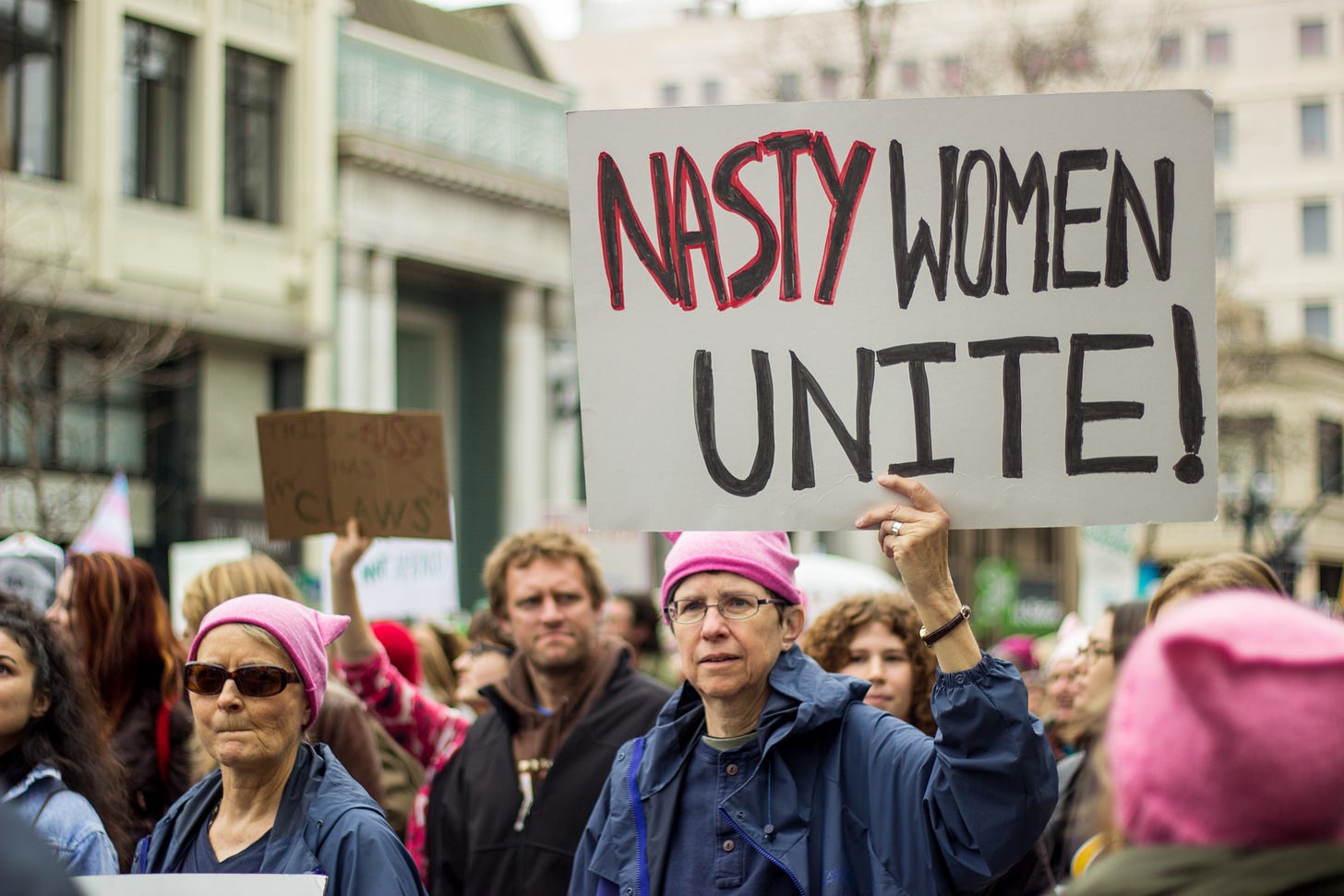Women like J.K. Rowling Will Not Free Us from Gender Ideology
Women like J.K. Rowling Will Not Free Us from Gender Ideology
Only men of courage can do it, and it’s not clear they will
The fruits of gender ideology are plain for all to see: an assault on masculinity and marriage; fathers cut off from their children; a growing rift between the sexes; the denial of biological reality; children indoctrinated to seek hormone treatments and surgeries; and the perversion of language and law. A recent study shows women, but not men, favoring radical social policies and gender ideology. Yet it is still socially unacceptable to criticize the core dogma—feminism—that started us on this path or to observe that men are generally better suited to lead our societies than women.
We’ve heard a lot lately about the courage of children’s book author J.K. Rowling, who has taken on the hate speech law of her homeland, Scotland, and pushed the government to admit it to be unenforceable—at least against a woman of her stature. Rowling deserves the applause she is currently receiving for her boldness. But Rowling is not the leader we need in current battles over free speech and sex realism. Like many prominent women, she is an enormously resentful feminist ideologue who trades in female privilege while pretending that women are everywhere in chains. While she rightly objects to the possibility that a woman could be charged with a hate crime for stating biological fact, she is preoccupied with so-called hatred against women, claiming bizarrely of gender-neutral phrasing such as “persons who menstruate” that “for those of us who’ve had degrading slurs spat at us by violent men, [such language is] not neutral, it’s hostile and alienating.” This is poor-me emotionalism and anti-male grandstanding pretending to argumentative coherence.
Rowling’s reflex hostility to men has led her to lash out at even obvious allies. She publicly disparaged Matt Walsh, conservative political activist and star of the documentary What Is a Woman, alleging that “He’s no more on my side than the ‘shut up or we’ll bomb you’ charmers who cloak their misogyny in a pretty pink and blue flag.” This absurd exaggeration, which fails to distinguish between a man who makes sense and one who makes deranged threats, showcases the feminist muddle of Rowling’s thinking. She objects to trans ideology, it turns out, not primarily because it is false to biological reality—despite evoking the truth of biological sex when useful—but because it involves men accessing women’s spaces and identities. For her, the transgender phenomenon is not about gender dysphoria or sexual fetish—nor 50 years of bigotry and discrimination against men—but about misogyny, her go-to explanation. Walsh too, she implies, is a misogynist despite his desire to protect women.
Her explanation of why she has spoken out against transgender ideology reveals a delusion of persecution, including the ludicrous contention that “We’re living through the most misogynistic period I’ve experienced,” and “Everywhere, women are being told to shut up and sit down, or else.” She provides no evidence, of course.
The intensity of Rowling’s sense of grievance is disabling. It leads her to extend cautious approval only to those men who will assist her in defeating gender ideology where and only where it negatively affects women. Out of bounds is any suggestion that sex differences have implications far beyond the trans controversy (such as for women’s ability to do men’s jobs), including for how society can best be organized to enhance the different capacities and inclinations of each sex. With her victim ideology and anti-male zealotry, Rowling offers no good path forward.
In the febrile world of radical feminism, women are in all realms at least the equal of men (if not superior) while also in need of special privileges, concessions, and exemptions due to their sex-specific vulnerabilities. Men are not seen as deserving of any concessions and certainly not any unique recognition of strengths, needs, or vulnerabilities. This blatant illogicality, which has rarely been stressed by mainstream commentators let alone successfully resisted, has primed women’s advocates to embrace a gyno-politics dangerously at odds with reality.
We see the incoherence even in women who go further than Rowling to recognize women’s role in gender radicalism. Canadian nurse Amy Hamm is one such. Hamm has been under investigation by the BC College of Nurses and Midwives over allegations of transphobia for her public statements against transgender policies. In a recent National Post op/ed, “Wokeness Hurts Women: Why Do So Many Support It?” she gets half the story right—an encouraging development, if still inadequate. After discussing the findings of a study in the Scandinavian Journal of Psychology that showed higher support for gender radicalism amongst women (as well as higher support for various leftish beliefs such as that “University reading lists should include fewer white or European authors”), Hamm laments that such a stance doesn’t make sense for women because women and girls are the ones who “suffer the most severe consequences.” “We are the ones who have lost our private spaces and sports categories,” she claims, and she wonders why any woman would accept “misogynistic tripe” like “uterus owner” or “chest feeder.” She then considers the possibility that women support trans rights because their greater empathy makes them more easily manipulated.
To her credit, Hamm does not accept this somewhat flattering explanation, venturing into forbidden territory instead. She suggests that it may be women’s greater susceptibility to cruelty and malice that accounts for their love affair with the viciousness of woke. Women manifest an “in-group, out-group” dynamic more strongly than men, and “have also been shown to demonstrate higher degrees of malevolence when compared with males.” “Perhaps it is not a tendril of our good nature that makes women ‘woker’ than men but merely a reflection of our darker, malicious side,” she proposes. The strong suggestion here is that we should stop pretending that women care more than men do about vulnerable people or social justice. Hamm’s discussion of the shadow side of female nature is surprisingly frank, but other facets of her argument are not.
In referring to women’s vulnerability to manipulation, Hamm says that the idea is not “complimentary of female intelligence.” But she has just quoted research showing that a significant number of women claim to believe fantasies about gender transition that cause significant damage to their daughters, sisters, and friends. Perhaps there isn’t much intelligence to slight? Moreover, Hamm ends her piece with a call to action for women: “What’s clear is that we need more women to demonstrate the courage of their convictions—and denounce the destructive, far-left dogma that is running roughshod over the majority of Canadians.” But what is the likelihood of this call being answered, and why direct it to the sex that, by and large, supports the damaging ideology? Wouldn’t it make more sense to call on men to lead the charge to defeat gender mania?
Despite criticizing “us-them” thinking in the article, Hamm’s argument is indebted to the same. She focuses exclusively on harms to women and girls, lamenting that “We’ve been accomplices in silencing ourselves, demonizing ourselves, and cheering on those who wish to refer to us by our body parts or functions.” As is well known by now, boys are also encouraged to “transition,” and they experience a great deal of corrosive gender-shaming for their maleness. Boys too have been deeply harmed by the gender ideology so aggressively spread in schools. Hamm’s argument assumes that harms to girls and women always matter more than harms to boys and men, even when those harms result in a suicide rate for boys that is 4 X higher than that of girls; she assumes moreover that women are perfectly justified in caring primarily, or even exclusively, about their own sex. Any man whose argument completely ignored evident harms to women and girls would not be granted a public space for his views, let alone be lauded for his integrity.
Hamm is silent about the decades-old origins of gender mania in feminist ideology, and it is on this point that the true incoherence of women’s activism becomes most clear. In the 1970s, the same feminists who protested women’s alleged victimization, as Hamm and Rowling now do, also insisted on the social rather than biological basis of sex differences, radically expanding Simone De Beauvoir’s famous contention that “One is not born, but rather becomes, woman” (The Second Sex, p. 283).
It was feminists who declared the end of biological sex, with Shulamith Firestone announcing in 1970 that “the end goal of feminist revolution must be […] not just the elimination of male privilege but of the sex distinction itself” (The Dialectic of Sex, p. 11). Andrea Dworkin alleged in 1974 that “We are, clearly, a multisexed species which has its sexuality spread along a vast continuum where the elements called male and female are not discrete.” Kate Millett, touting the (now discredited) sexology research of John Money in 1970, was confident that “the best medical research points to the conclusion that sexual stereotypes have no bases in biology” (Sexual Politics, p. 27). Judith Butler elaborated two decades later that “Genders can be neither true nor false, neither real nor apparent, neither original nor derived” (Gender Trouble, p. 141).
Such gender radicalism spread from the theorists into the society at large. It has been women inspired by feminism who thought it appropriate to shame boys in school, at times forcing them to apologize to girls for the alleged sins of their sex, at times subjecting boys to verbal abuse for their maleness while punishing and isolating them far more than girls. It was women inspired by feminism who bullied their sons to accept hideously destructive anti-male guilt. It was women inspired by feminism who forced boys’ sports teams to admit girls, caring nothing about how the sports, and the male camaraderie they fostered, were thus radically altered. One can find extensive discussions online about the advantages and disadvantages of allowing girls to play on boys’ sports teams that make not one mention of the effect on the boys. All of junior hockey in Canada has been transformed on the off chance, it seems, that a trans boy may enter the boys’ change room. Feminists did not call out their sisters for these and many like initiatives—and why should they? Their focus, as it always is, was on gaining advantage for their sex.
The selfish myopia of these spokespersons is their only consistency.
Now that it is girls’ sports, girls’ opportunities, and girls’ privacy rather than boys’ that are explicitly threatened, it is naturally assumed that men of good will must care because men are always expected, naturally and without reciprocity, to care about the wellbeing of girls and women. And most men do (though see Lucian Valsan’s caustic, thought-provoking take on the matter). Hamm and Rowling both assume that some significant number of men will conveniently forget the decades-long assault on masculinity and masculine spaces that has been almost completely engineered by the misandry of women, and that paved the way for the assault on femininity, if that’s really what the trans movement is. (From my vantage point, it seems that femininity is still championed and exalted in our culture, quite unlike masculinity, which is consistently and almost universally disparaged and degraded.)
The biggest issue not addressed by Hamm, however, has to do with the female leadership she calls for. If a significant subset of women are incapable of acting in their own best interests, let alone in those of society as a whole—particularly the best interests of (female) children—is it not time to rethink the alleged equal capacity of women to lead our societies? Hamm and others who discuss the trans threat never come to this point, and it is quite unrealistic to expect that they will. Feminism has deliberately and systematically sought to diminish male leadership in the home and in the wider society: it has championed no-fault divorce, legalized abortion, feminized the workplace, destroyed men’s right to father their own children, made men infinitely vulnerable to all manner of heinous allegations, and excluded men from positions of leadership on the ground of gender diversity. Feminists and their enablers did all of this with claims about the moral superiority of women, their greater caring and accountability, their collaborative style, their ability to take criticism, their emotional intelligence. All of these have led us to where we are.
What we need now is a frank acknowledgement of the perils of female leadership and of feminist precepts. Most women don’t want this conversation, and most men are afraid to raise it, but it’s long past due.
If we want to restore civilizational sanity, we will need to recognize all forms of feminist ideology—yes, even the so-called moderate ones—for the destructive, hateful, and irrational delusions they embody. Feminists’ colonization of academia, law, medicine, journalism, social work, the arts, and culture, with their non-stop touting of male evil and superior female competence, must be turned back. Women who express public disdain for men should be ridiculed and hounded out of their positions.
But reforms will need to be far more profound. We need to begin protecting men’s jobs and earning power, not least by ending all affirmative action and equity programs. The professions should be open only to the most talented and dedicated; women must give up their many demands for and entitlements to special treatment in the workforce. We must restore due-process rights to men accused of abuse and harassment, and must fully acknowledge the widespread damage of false allegations. We must also return to men the legal and social right to father their children and to guard against paternity fraud. Such would involve the end of no-fault divorce and elaborate alimony and child support packages that position men as financial providers without paternal rights. If marriage is to remain a viable institution, we must ensure that it is not a legal and emotional hazard for men. Through these and other measures, we can begin to restore public respect and recognition for men’s continuing sacrifices, dedication, and contributions to our societies.
It is far from clear that we have the stomach for any of these reforms, or even for a tentative conversation about them. But it is a certainty that if we continue as we are, we will keep hearing from women mystified and enraged over where female leadership has brought us all, while men, hobbled and disincentivized by decades of feminism (as well as by their own weakness and chivalry) will be told they bear the blame for the mess.
Source: The Fiamengo File





Comments
Post a Comment